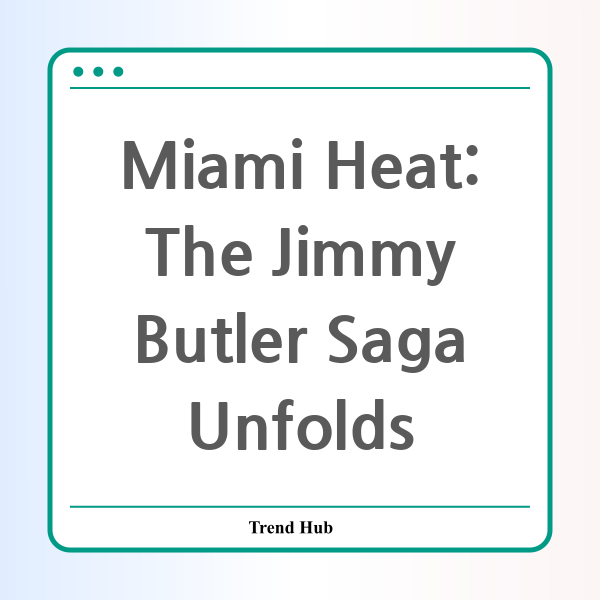* This website participates in the Amazon Affiliate Program and earns from qualifying purchases.

What happens when a superstar clashes with an organization famous for its rigid culture? The Miami Heat are currently navigating a turbulent chapter with their All-Star forward Jimmy Butler, and it’s bringing the franchise’s legendary "Heat Culture" into question.
In early January, Jimmy Butler faced a seven-game suspension due to conduct deemed detrimental to the team after a damaging loss. This suspension followed reports of Butler's discontent with his role on the team and his performance during a rocky stretch in the season. This situation poses a significant existential challenge to the Miami Heat, an organization founded on principles of discipline, hard work, and unity.
Coach Erik Spoelstra’s responses during press conferences reflect the organization’s cautious approach to the situation. Rather than indulge questions regarding Butler’s specific conduct, Spoelstra conserved the narrative focus on the broader theme of "Heat Culture." This approach intends to shield the team’s core values from the scrutiny surrounding Butler's actions.
However, the tension is palpable. Sources indicate that Butler's relationship with the team has frayed, with teammates reportedly weary of the ongoing drama. Butler’s desire for a trade coupled with the Heat’s reluctance to accommodate such a request leaves a lingering uncertainty in the locker room.
Butler's history of tumultuous exits from teams like Chicago, Minnesota, and Philadelphia raises questions about his future in Miami. The Heat’s management, led by Pat Riley, is navigating a delicate balance between respecting Butler's contributions and maintaining the integrity of a culture designed for success.
Despite Butler’s contributions—most notably his key roles in leading the Heat to two NBA Finals appearances—his unique status within the team has previously led to unprecedented privileges that diverge from the typical Heat ethos. Butler has enjoyed greater leeway in terms of training, travel, and social media presence, but this has also led to growing skepticism within the organization.
As Udonis Haslem retires, marking the end of an era for the team, the search for a new leader to carry forward the Heat’s culture becomes urgent. Young stars like Bam Adebayo are being groomed to take on this mantle—something Butler reportedly has struggled with, as he feels overshadowed by the shifting priorities of the franchise.
While Butler continues to assert his commitment to the game, suggesting he wants to rediscover his joy playing, his statements hint at an underlying frustration with how the team is evolving. "Wherever that may be, we’ll find out here pretty soon," he declared, emphasizing his uncertainty about his future with the Heat.
The uncertainty surrounding Butler’s future is compounded by the financial implications of his suspension. The loss of nearly $2.3 million due to the suspension adds weight to the already complex emotional landscape he must navigate within the organization.
Ultimately, the saga of Jimmy Butler and the Miami Heat illustrates a broader theme of loyalty versus the evolution of a team’s strategy. The conflict between established players and emerging talent could redefine the Heat’s approach in the coming seasons. Will Jimmy Butler adapt to a secondary role under the bright Miami spotlight or seek a path toward a team where he can reestablish himself as the focal point? Only time will tell.
As the Heat attempt to mend the rift between the star player and team ethos, they must carefully consider the trajectory of both their culture and roster. In an era where flexibility and adaptability are keys to success, this ongoing situation could either serve as a catalyst for renewed commitment to the Heat Culture or signal the beginning of a much-needed transition.
* This website participates in the Amazon Affiliate Program and earns from qualifying purchases.